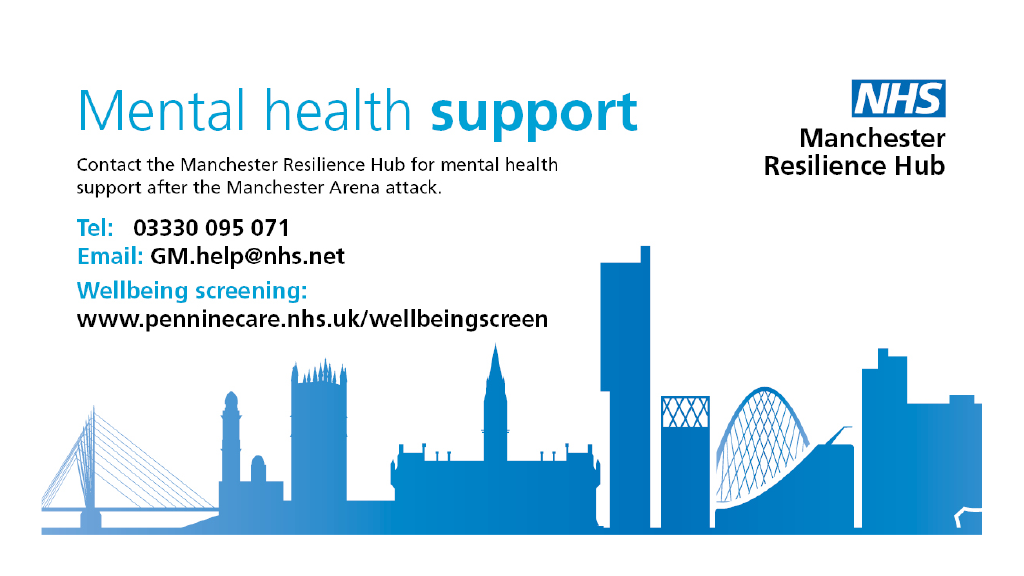Guidance for Parents and Carers – supporting Children and Young People during the first anniversary of the Manchester Arena Attack
This guidance provides information on how the first anniversary of the Manchester Arena Attack may affect the emotional wellbeing of children and young people. It has been developed for parents and carers by NHS professionals with experience of supporting people involved in traumatic events.
It is important to acknowledge that anniversaries of traumatic events can be emotional events. Whilst the focus of parents and carers is on supporting those you care for, our ability to do that effectively depends on our ability to look after ourselves. If you have also been affected by the attack the suggestions in this guidance may also be helpful for you.
Responses to traumatic events
In the days, weeks and months after the Arena Attack many people will have experienced one or more of the following common reactions to having been involved in the attack:
• Troubling thoughts, memories and mental imagery
• Disturbed sleep and/or nightmares
• Disturbed appetite, with either a marked increase or decrease in feeling
hungry
• Sadness, despondency and apathy
• Irritability and anger
• Guilt and shame
• Emotional numbness
• Increased watchfulness or “jumpiness”
• Increased anxiety
• Poor concentration
Sometimes people who were initially unaffected may experience difficulties many months after an event. These reactions may become apparent for the first time around the anniversary. It is important to remember that this is a normal response and not something which should be responded to with undue concern or worry as they may well pass.
Talking to children and young people about the attack.
The attack has affected many children, families and communities. Children and young people may have had their beliefs about the world and their safety shattered. For those still experiencing difficulties many people also question their ability to cope. Providing clear, age appropriate factual information will be helpful. Talking and marking the anniversary is also important, particularly if it holds significance for your family.
It may be helpful around the anniversary to share the following with children and young people:
• It is okay to feel upset, guilty, angry or worried around the time of the
anniversary and it is normal to have an increase in trauma responses.
• Neither ignore nor dwell on intrusive thoughts, images or memories, but rather just notice that they are there. Remember that they are just thoughts and allow them to pass of their own accord.
• Spend time with loved one and close friends, resisting any temptation to
isolate yourself from others.
• Ask friends how they are feeling, and where appropriate talk about how you are feeling.
• Keep active, by going for a run or talking regular walks, ideally in the company of friends or family.
• Plan relaxing and comforting things to do and think about how you might
manage if you are upset.
• Keep to your usual routine.
• Try a “digital detox” by switching off social media alerts on laptops,
smartphones and tablets for at least some of the time around the anniversary.
• If age appropriate, do not use non-prescription drugs or increase your alcohol intake to help in managing any difficult feelings, as this is likely to increase the risk of further difficulties in the future.
Support from school or college
Guidance has been sent to schools and colleges to help them support those directly affected by the attack. Some suggestions have been:
• Identify students and staff that have been directly affected by the attack and ensure there are systems in place to monitor and support them.
• Recognise how different age groups may demonstrate increased distress – pay attention to changes in behaviour, friendships and performance.
• Identify a familiar trusted adult for the young person to talk to should they wish to do so - formal counselling is not necessary.
• Reduce any unnecessary demands.
• Consider supportive measures for SATs and any formal exams
• Avoid practice fire drills and any non-essential safety practices. If unavoidable warn students and staff who may be experiencing trauma symptoms.
• Consider the curriculum around the time of the anniversary
Anniversary events
Everyone will have their own view on how they want to mark the anniversary and there is no right or wrong way to do this. For some people it will be quiet time to reflect with their family, for some it will be attendance at planned events whereas others may wish to carry on with their normal routine. Do talk to your child about the anniversary and how they wish to mark it, but also pay attention to your own wishes and needs.
For most people any reactions around the anniversary will soon pass. However, for some people feelings which emerge at the anniversary may persist, or be so intense that it will be worth discussing them with your GP, school nurse, or contacting the Resilience Hub for advice.
